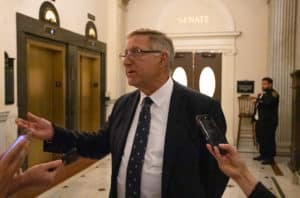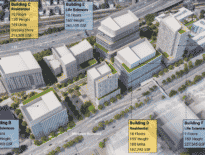
State Sen. Michael Rodrigues talks to reporters in the early hours of Monday, Aug. 1, 2022 about the outcome of the 2021-2022 legislative session. Photo by Sam Doran | State House News Service
Hundreds of millions of dollars in housing production investments are in limbo after state legislators held off on finalizing a popular economic development bill Sunday night in the face of uncertainty over how much extra tax revenue they actually have to spend.
The House and Senate headed into informal session for the rest of the year Monday, according to their joint rules, without negotiators coming to a compromise between the two bodies’ versions of the annual economic development bonding bill. Informal sessions are typically only reserved for small or non-controversial bills, and thanks to a requirement that bills can only pass with unanimous support during them, a single legislator has the power to stop any one measure. With roll-call votes necessary for many of the bonding bill’s provisions, it’s possible many parts of the bill may whither on the vine, including hundreds of small allocations for local projects traditionally packed into each year’s bill.
“I think members are disappointed. You know, we’re all disappointed because we all had projects and investments in that piece of legislation. We had investments that are necessary for our hospitals, for our human service workforce, for early education,” Senate Ways and Means Chairman Michael Rodrigues said shortly before sunrise Monday. “So we’re disappointed, but we want to make sure we get it right.”
A last-minute revelation that a 1986 voter law could trigger as much as $3 billion in tax relief caught Beacon Hill off guard and seemed to paralyze Democrats as they struggled to decide whether to pass the $4 billion economic development bill, which also included about $1 billion in tax relief, or backtrack and chart a new path.
Windfall for Housing
Both the House and Senate versions of the bill contain massive windfalls for housing production at a time when advocates and industry groups all say the state needs to dramatically increase how much housing it builds to help rein in massive price increases.
The Senate allocated $150 million for workforce housing development, $150 million for affordable housing projects that use heat pumps and other green building techniques and $100 million for the CommonWealth Builder program, a new funding source that lets developers sell condominiums at prices affordable to low- and middle-income buyers, but which carry no deed restrictions for subsequent resale, unlike traditional affordable housing units. For its part, the House dedicated $101 million to finance affordable housing projects and $75 million to seed developments by minority-owned firms in an effort to build pathways to diversify Massachusetts’ largely-white real estate development industry.
The spending would have come on top of the $624 million in federal COVID relief the legislature earlier allocated to housing production.
Joe Kriesberg, executive director of the Massachusetts Association of Community Development Corporations, estimated the funding could have produced as many as 3,000 to 4,000 new units of housing over the next five years as it was designed to flexibly fill gaps in projects’ financing packages and get developments over the finish line. The legislature’s failure to pass the bill was “very disappointing,” he said.
“It’s hard to imagine there won’t ultimately be a smaller bill, which is unfortunate because these investments are needed,” he said. “The housing investments that are on the table are essential to mitigating the crisis, expanding opportunities for home ownership and maintaining our momentum. They can make a difference and be put to use right away.”
Eric Shupin, director of public policy at the Citizens Housing and Planning Association, said the group was “disappointed” that the bill didn’t pass.
“The legislation had critical resources and policies for affordable housing. The bill would have provided the opportunity to plan for growth to ensure everyone in every community could thrive, meet the growing demand for housing, and invest in our neighborhoods in ways that benefit everyone,” he said in an email to Banker & Tradesman.
Stadium on Shaky Ground
Several policy measures were also included in the bills. State senators included a measure written by state Sen. Brendan Crighton of Lynn and backed by Abundant Housing MA to legalize accessory dwelling units on single-family lots of at least 5,000 square feet statewide. And state Rep. Dan Ryan of Charlestown added a measure to exempt Everett’s Exelon power plant site from the state’s Chapter 91 regulations governing waterfront uses and public access to the waterfront. The measure would have let any future development – potentially including a stadium for the Kraft Group-owned New England Revolution – sidestep rules governing height and mass of anything built on that 43-acre lot once the power plant closes in 2024, but it also raised hackles among environmental advocates who characterized it as “legislative mischief.”
The difficulties inherent in passing controversial bills through the legislature’s informal session process means both measures face uncertain futures between now and the next legislative session in January.
Rodrigues said the economic development bill would remain in conference committee until the full scope of what the state has to give back to voters is clear. House Speaker Ron Mariano said the legislature doesn’t plan on revising the 1986 law, called Chapter 62F. Mariano said legislators were also concerned about a possible recession, and needing to husband money for that. Gov. Charlie Baker has called for both the economic development bill’s $1 billion in tax relief to advance regardless of the the $2.5 billion to $3 billion in givebacks to taxpayers.
It sets up a footrace between housing advocates, local officials and others with interests in the economic development bill to try to protect different spending priorities.
MACDC’s Kriesberg and CHAPA’s Shupin said their groups would be advocating to make sure the housing elements of the bill get passed during informal session, with Shupin specifically referencing the $400 million in spending envisioned by the Senate.
State House News Service staff writers






